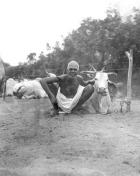Osho on “Who am I?”
Question 3
Beloved Osho,
Would you please talk about the sadhana based on holding as much as possible to the “I” thought or the sense “I AM” and on asking oneself the questions, “Who am I?” or “From where does the ‘I’ arise?” In what way does this approach to meditation differ from that of watching the gaps between one’s in-breath and out-breath? Does it make any difference whether one witnesses the breath focusing on the heart center or on the lower belly center?
It is an ancient method of meditation, but full of dangers.
Unless you are alert, the greater possibility is that you will be led astray by the method rather than to the right goal.
The method is simple -- concentrating yourself on the concept of I, closing your eyes and inquiring, "Who am I?"
The greatest problem is that when you ask "Who am I"... who is going to answer you? Most probably the answer will come from your tradition, from your scriptures, from your conditioning.
You have heard that "I am not the body, I am not the mind. I am the soul, I am the ultimate, brahma, I am God" -- all these kinds of thoughts you have heard before.
You will ask a few times, "Who am I? Who am I?" -- and then you will say, "I am ultimate, BRAHMA." And this is not a discovery, this is simply stupid.
If you want to go rightly into the method, then the question has not to be verbally asked. "Who am I?" has not to be repeated verbally. Because as long as it remains a verbal question, you will supply a verbal answer from the head.
You have to drop the verbal question. It has to remain just a vague idea, just like a thirst. Not that "I am thirsty," -- can you see the difference? When you are thirsty, you feel the thirst.
And if you are in a desert, you feel the thirst in every fiber of your body. You don't say, "I am thirsty, I am thirsty." It is no longer a linguistic question, it is existential.
If "Who am I?" is an existential question, if you are not asking it in language but instead the feeling of the question is settling inside your center, then there is no need for any answer. Then it is none of the mind's business.
The mind will not hear that which is non-verbal, and the mind will not answer that which is non-verbal.
All your scriptures are in the mind, all your knowledge is gathered there.
Now you are entering an innocent space. You will not get the answer. You will get the feel, you will get the taste, you will get the smell.
As you go deeper, you will be filled more with the feeling of being, of immortality, blissfulness, silence... a tremendous benediction.
But there is no answer like, "I am this, I am that." All that is from the scriptures. This feeling is from you, and this feeling has a truth about it.
It is a perfectly valid method.
One of the great masters of this century, Raman Maharshi, used only this method for his disciples: "Who am I?" But I have come across hundreds of his disciples -- they are nowhere near the ultimate experience. And the reason is because they know the answer already.
I have asked them, "Do you know the answer?"
They said, "We know the answer."
I said, "If you know the answer, then why are you asking? And your asking cannot go on very long -- do it two or three times and the answer comes. The answer was already there, before the question."
So it is just a mind game. If you want to play it, you can play it. But if you really want to go into it as it was meant by Raman Maharshi, and by all the ancient seers, it is a non-verbal thirst.
Not knowing oneself hurts, it is a wound. Not knowing oneself makes the whole of life meaningless. You may know everything, only you do not know yourself -- and that would be the first thing to know.
So if you can avoid the danger of falling into a verbal question, it is perfectly good, you can go ahead.
You have also asked about witnessing, watching the breath and where one should watch. Anywhere -- because the question is not where you are watching, the question is that you are watching.
The emphasis is on watching, watchfulness. All those points are just excuses. You can watch the breath at the tip of the nose where the breath goes in, you can watch it while it is going in, you can watch it when it returns -- you can watch it anywhere. You can watch thoughts moving inside. The whole point is not to get lost in what you are watching, as if that is important. That is not important....
The important thing is that you are watchful, that you have not forgotten to watch, that you are watching... watching... watching.
And slowly slowly, as the watcher becomes more and more solid, stable, unwavering, a transformation happens. The things that you were watching disappear.
For the first time, the watcher itself becomes the watched, the observer itself becomes the observed.
You have come home.
-Osho, "Beyond Enlightenment, #9, Q3"



 https://oshofriends.com/on_maharshi/16212
https://oshofriends.com/on_maharshi/16212